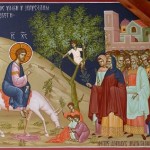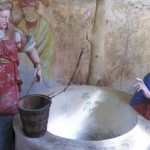Matthew 7:13-29
When I lived in England with my family for 10 months several years ago (to begin my Ph.D. work at Lancaster University), we lived in student housing. We had a family flat, which wasn’t too bad – except that it was on the fourth floor. One of the most memorable experiences, and not a pleasant one, was being woken from a deep sleep at 2 or 4 a.m. by the most piercing, high-volume fire alarm imaginable. On several occasions, the alarm sounded, shocking us out of sleep. We threw on some warmer clothes and our shoes without socks, re-assured our little children, and then bustled them down three flights of stairs to safety.
Little did I know that two years later, after I had returned to the U.S. that an alarm, even louder, even more piercing, even more disturbing than the one in England, would go off on the week of August 3rd, 2003.
But an ear-splitting, church-splitting alarm has gone off. Some were in a deep sleep and have only by such a loud and fearsome noise been wakened. Others have seen the building burning for some time and escaped before such a loud alarm had to go off. Sadly, many seem content to sleep through it and allow themselves and the building to burn all the way down.
I’m speaking about the Episcopal Church USA’s decision to elect an openly homosexual man to be the bishop of New Hampshire.
Do you remember the first king of Israel? Saul was at first a righteous man, a man God hand-picked to lead Israel. Though he stood a head taller than those around him, he was so humble that he hid among the luggage when people came looking to crown him.
But his heart slowly turned from God. He began to do his own will, and not the will of His father in heaven. He offered up unholy sacrifices, consulted a witch, and became jealous over one more righteous than he. Ultimately, he died on the battlefield, along with his more noble son.
When David heard the news, rather than rejoicing, he lamented over Saul and Jonathan and taught his lament to Israel. He said: “The beauty of Israel is slain on your high places. How are the mighty fallen!”
And so we, too, might lament over the fall of our sister, the church formerly known as the Episcopal Church USA (now simply The Episcopal Church).
So, how did we get here? How could it come to this? There are Anglicans in The Episcopal Church (TEC) who serve communion to the unbaptized, who bless same-sex marriages, ordain and consecrate those who are openly homosexual, conduct Wiccan masses, deny the Bible is the Word of God, are Moslems and yet a Christian priest, etc. How could a once godly church now suffer through such shame and ungodliness?
The answer is that for years and years the Episcopal Church has failed to heed the warning of Jesus Christ found in Matthew 7:15-16 “Beware of false prophets, who come to you in sheep’s clothing, but inwardly they are ravenous wolves. You will know them by their fruits.”
As with all sin, it happened in stages. And it has all happened not in spite of the shepherds but often because of them. Go read about Bishops Pike, Robinson, Righter, Spong, Schori and others if you want to learn about wolves in sheep’s clothing.
As Edmund Burke famously said “All that is necessary for the triumph of evil is for good men to do nothing.”
“Beware of false prophets, who come to you in sheep’s clothing, but inwardly they are ravenous wolves. You will know them by their fruits.”
But Father Erlandson, you might say, how can we know false prophets when they come around? Sometimes it’s confusing, and sometimes, even though I know they are wrong, they sound so intelligent. Let me be very clear here: this battle we have just witnessed isn’t really about homosexuality. Yes, that is the particular issue that has been raised, but there are even deeper issues at stake. Again, the real issue is obedience to God and His Word
At stake is not just this one sinful behavior: it is our entire relationship to God and His Word. This raises the issue of standards: how shall we know if we love God? How shall we know if someone who claims to love God truly does?
Fortunately, God has given us a standard by which to judge the fruits of men: and that is His holy Word. You shall know them by their fruits, and you shall know their fruits by comparing them with what God says in His Word.
Many today call themselves Christians and claim to love God. But God says in 1 John 5: 3, “For this is the love of God, that we keep His commandments.”
If you love God, you will obey God. You shall know them by their fruits.
And God is clear in His Word about what He believes about homosexuality – and about many other things. Go and find the passages on homosexuality yourself, and remember that fornication (which Jesus Himself condemns) includes all sex outside of marriage.
This issue, therefore, is about obedience to God and His Word: don’t let anybody tell you otherwise. What should concern us about many younger Christians today, therefore, when they accept homosexuality, is that they have really given up the Bible as the Word of God. Our attitude about homosexuality is just one indicator of what is our true authority in our lives.
Many will come claiming to be Christians, claiming to speak for God. Do not be fooled: You shall know them by their fruits. If even a bishop, perhaps even your local bishop, should come to you and say that God condones homosexuality or that God condones any sin that God has clearly said He detests – do not believe him. Yes, we all sin, but beware of those who call sin righteousness and who call God a liar.
“Beware of false prophets, who come to you in sheep’s clothing, but inwardly they are ravenous wolves. You will know them by their fruits.”
So how should we respond to all of this? What does this mean to those of us who believe God and His Word over the words of sinful men?
First, God is still on His throne. In spite of the evil that men do (and we do it every day), God is still in His heaven. He still reigns. God is still God, and His holy will shall be done – with or without us. This, and only this, is our assurance against any evil.
Second, thank God that there is a place to go. Let me assure you that in the Reformed Episcopal Church (REC), for example, things are different than in most of The Episcopal Church. Every one of our bishops, every one of our seminary professors is required to uphold the Bible as the Word of God and to uphold the traditions of the Church. Any bishop or priest who rejected the Word of God in the REC would be looking for another church the next day. And Reformed Episcopalians are on the same side as the vast majority of Anglicans worldwide (especially if you count only the ones who actually go to church!)
Third, you must never become complacent. It would be easy for us to be self-righteous, thinking that because we are in the Reformed Episcopal Church (or whatever church you’re in) that we have room to boast, or that we are safe. But it was complacency, doing nothing when men did evil, that has caused the ruin of the Episcopal Church in the first place. Should I, or any other minister of the gospel, or any other person professing to be a Christian, claim a right to sin or claim any standard that contradicts God and His Word, it is your Christian duty to speak up and set them straight. Never, never, become complacent about God or about sin.
Finally, what about ourselves? My admonition to never become complacent
means especially don’t become complacent about your own sin. Paul says in Ephesians 5:14, “Awake, O sleeper, and arise from the dead, and Christ shall give you light.” The time for slumber is past: the time to awaken to God’s call upon your life is now. My exhortation to you today is that you make every effort to heed the warnings of Jesus Christ. Learn from the tragic lessons of others before you.
Remember, that several verses before Jesus taught about false prophets and knowing men by their fruits, He also says: “For with what judgment you judge, you will be judged.” Just as you are commanded to know them by their fruits, so shall others know you by your fruits.
Do you remember when David squawked and fumed when the prophet Nathan told him about the rich man with many sheep who took the one sheep of the poor man? David advocated that the man be put to death. And then Nathan turned to him and said, “Thou art the man.”
You and I are the man. We are the ones who stand as sinners before God. The same question that every sinner in the world has to face is staring you in the face this morning: and that is “Am I living as Jesus Christ would have me live?”
We have spent perhaps more than enough time examining the sins of others. The real question for you this morning is, “When the world looks at my fruits, what do they see?” For just as surely as we can look at the fruits of others and see that something is not right, others may look at your life and wonder about your fruits.
A good tree, one rooted in Christ, watered by the Living Water, fed by the Bread of Life, will produce good fruit, the fruit of obedience to God.
And to all who are trapped in sin this morning, of whatever kind, God offers the promise of forgiveness through His Son. But He offers it only to those who are truly repentant and intend to lead a new life, walking from henceforth in His commandments. Make peace with God, while there is still time. Kiss the Son, lest He be angry, and His wrath is kindled.
Brothers and sisters in Christ, “Beware of false prophets, who come to you in sheep’s clothing, but inwardly they are ravenous wolves. You will know them by their fruits.”
But remember: they will also know you by your fruits, which are one of the best arguments for God and His holy kingdom that God has ever devised.
Prayer: Grant we beseech thee, Almighty God, that the words which we have heard this day with our outward ears, may, through thy grace, be so grafted inwardly in our hearts, that they may bring forth in us the fruit of good living, to the honor and praise of thy Name; through Jesus Christ our Lord. Amen.
Point for Meditation:
- If people judged you by the fruits of your life, what would they say and think?
- Are you guilty of a double standard – of judging the sins of others more harshly than you treat your own?
Resolution: I resolve to seek to bear good fruit today by confessing my sins and by asking the Lord where He would have me plant, water, fertilize, or prune today.
© 2016 Fr. Charles Erlandson












